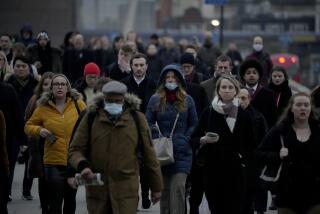French infections rise, Spain cracks down on nightclubs

- Share via
PARIS — France’s coronavirus infection rate crept higher Saturday, and Spain cracked down on nightlife, but German authorities were confident enough to send a ship out to sea with 1,200 passengers for a weekend test of how the cruise industry can begin to resume operations.
France’s daily new infections are rising — up to 1,130 on Friday. Health authorities warned that the country is going backward in its battle against the COVID-19 pandemic, which has killed at least 30,195 people in the country, and that infection indicators now resemble those seen in May, when France was coming out of its strict two-month lockdown.
“We have thus erased much of the progress that we’d achieved in the first weeks of lockdown-easing,” health authorities said, adding that the French appear to be letting down their guard during summer vacation, and those testing positive are making less of an effort to self-isolate.
The French authorities appealed for a return to “collective discipline,” asking people to work from home and get tested if they have any suspicion that they are infected.
In Spain, Catalonia became the latest region to crack down on nightlife, trying to tamp down on new infection clusters. The wealthy northeast region, home to Barcelona, ordered all nightclubs to close for 15 days and put a midnight curfew on bars in the greater Barcelona area and other towns around Lleida that have become contagion hot zones.
Spain has reported more than 900 new daily infections for the last two days, as authorities warn that the country that lost more than 28,000 lives before getting its outbreak under control could be facing the start of a second major outbreak.
Despite the concerns, some European countries kept up their gradual reopening Saturday.
Swimming pools and gyms in England were back in business as public health officials extolled the benefits of exercise in fighting COVID-19. Britain announced a fresh attack on obesity as part of the move, hoping that a fitter nation might be able to minimize the toll of future waves of the virus.
A German cruise ship set sail for the first time since the industry was shut down. Mein Schiff 2 sailed Friday night from the port of Hamburg toward Norway, and passengers will spend the weekend at sea with no land stops before returning Monday to Germany. The ship, with a normal capacity of 2,900, had 1,200 people on board.
With many other cruise companies now looking toward trips in 2021, interest was sure to be high in how Germany, which has been praised for its handling of the pandemic, can reinvigorate the struggling industry.
In other parts of the world, the pandemic appeared to have the upper hand.
The United States has the world’s most infections, topping 4.16 million, and deaths, with more than 146,000. It is followed by Brazil, with more than 85,000 deaths, and India, with more than 31,000. In India, which has seen more than 1.3 million infections, the Home Ministry issued an advisory calling for the avoidance of large gatherings on Independence Day, Aug. 15.
South Africa, Africa’s hardest-hit country, reported more than 13,000 new cases Saturday, raising its total to more than 408,000.
South Korea on Saturday reported more than 100 new cases for the first time in four months. The 113 cases included 36 workers returning from Iraq and 32 crew members of a Russian freighter.
Worldwide, more than 15.9 million infections and 641,000 deaths have been reported, according to data compiled from government announcements by Johns Hopkins University. Experts say all those figures understate the true toll of the pandemic because of limited testing and other issues.
In the United States, Texas, which has been struggling with the virus, braced for the arrival of Hurricane Hanna. The storm is heading for Nueces County, one of the state’s coronavirus hotspots.
In Mississippi, Gov. Tate Reeves tightened controls on bars to protect “young, drunk, careless folks.” Bars already were limited to operating at 50% capacity. Now patrons will have to sit down to order alcohol, and sales stop at 11 p.m.
New Orleans Mayor LaToya Cantrell ordered bars closed and banned restaurants from selling alcoholic drinks to take away. That came after more than 2,000 new cases were reported in Louisiana, including 103 in New Orleans.
In Australia, Premier Daniel Andrews of the southern state of Victoria announced five deaths and 357 new cases. Victoria, where the death toll has risen to 61, earlier closed its border with neighboring New South Wales.
In Yemen, 97 medical workers have died of COVID-19, a serious blow to a country with few doctors that is in the midst of a 5-year-old war, the humanitarian group MedGlobal said in a report. The “overwhelming death toll” will have “immense short-term and long-term health effects,” said the report’s lead author, Kathleen Fallon.
More to Read
Sign up for Essential California
The most important California stories and recommendations in your inbox every morning.
You may occasionally receive promotional content from the Los Angeles Times.










